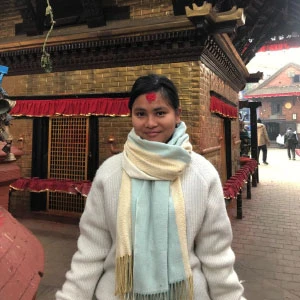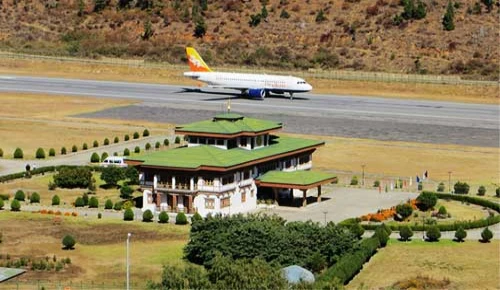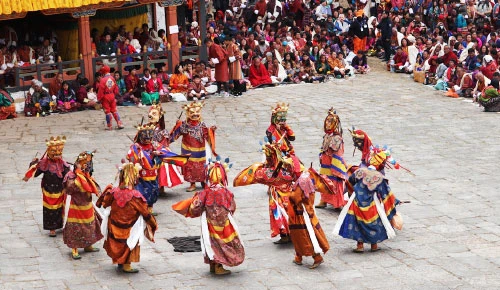Exploring Tharu Culture on Your Chitwan Tour
Chitwan is a place that comes to mind when mentioning the Chitwan National Park, which has been properly developed and is a UNESCO World Heritage Site, where rhinos, elephants, tigers, and enormous flocks of birds can be found. Nature lovers dream about it due to its jungle tours, canoes and wildlife. However, the Tharu culture, a living heritage that enhances the experience and provides a sense of purpose to the visit, is another treasure that makes any visit worthwhile.
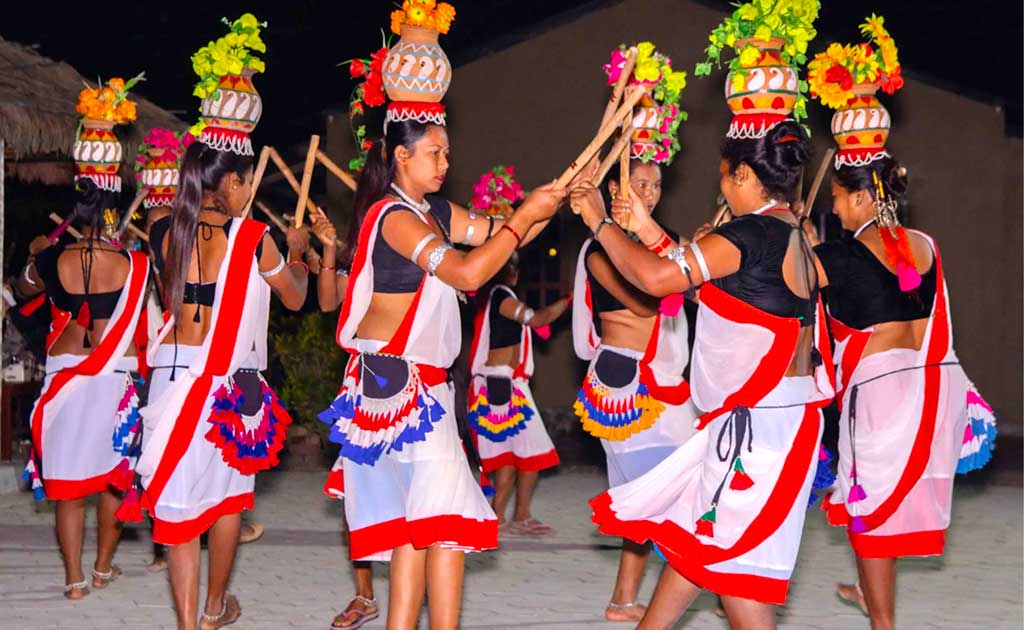
The Tharu were initially inhabitants of Nepal in Terai, and they were capable of living in peace with rivers and trees during their lifetimes. Their cultural experiences are appealing due to the meaningful connection between their culture, strength, hospitality, and the wildlife they encounter. Villages of Tharu people can also be visited, where one has fun in mud-painted huts, stick dances, traditional foods (dhikri and bagiya), and festivals like Tharu New Year (Maghi).
One more feature of Chitwan is that the tourists are shown the Tharu culture, the style of life in touch with the ground, where the family values and traditions are inherited with pride. This experience balances jungle adventure with the opportunity to learn about and engage with local culture, making a Chitwan tour not just a getaway but also a narrative that includes more than just wildlife.
Table of Contents
Who Are the Tharu People?
The Tharu people are one of Nepal’s oldest and most distinctive ethnic communities, primarily living in the Terai lowlands. Known as the “people of the forest,” they have traditionally lived in close connection with nature, relying on farming, fishing, and foraging as their main livelihoods. Their history is also unique because the Tharu people were born immune to malaria, which was initially prevalent in the Terai and could not be transmitted to other areas. This isolation is what helped them to retain their cultures, languages and traditions throughout centuries.
The Tharu culture is characterized by a large number of beautiful traditional customs, expressed in their bright costumes, silver, and house ornaments, as well as their mud-covered and symbolically painted houses. The Tharu people are also hospitable, have a community of warm hearts, and possess various oral traditions. The Tharu people have now become proud of their culture and have showcased their dancing, festivals, and lifestyle to the tourists, which have been part of a necessary Chitwan tour.
Tharu Culture: A Living Heritage
The Tharu culture is one of the most unique and fascinating parts of a Chitwan National park tour. The Tharu people have lived in the Terai region for centuries, developing a lifestyle deeply connected to nature and their surroundings. Their traditions, language, and daily practices reflect a simple yet meaningful way of life that visitors find truly captivating.
One of the most eye-catching aspects of Tharu culture is their traditional dress and ornaments. Women often wear colorful sarees, known as Lugga, along with beautifully handcrafted jewelry made from silver, beads, and coins. The men usually wear simple yet distinctive attire, especially during festivals and celebrations. These vibrant outfits bring a splash of color and energy to any cultural gathering.
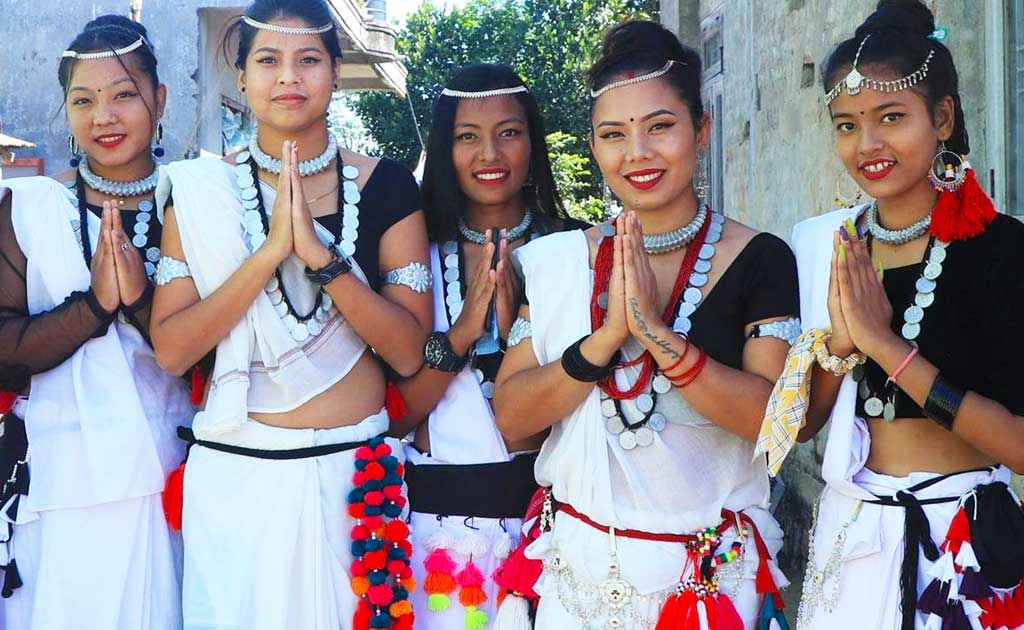
Tharu homes are another highlight of their heritage. Most houses are built from mud, clay, and thatched roofs, designed to stay cool in the hot summers and warm during the winters. The walls are often decorated with hand-painted motifs and patterns, giving each home a warm, artistic touch. This simple yet eco-friendly architecture shows the Tharu people's deep connection to nature and resourcefulness in using locally available materials.
Tharu Cuisine: A Culinary Delight
One of the best ways to experience Tharu culture on your Chitwan tour is through its unique and flavorful cuisine. The Tharu people use fresh, locally grown ingredients to prepare simple yet delicious meals that reflect their connection to the land. Most dishes are cooked with minimal spices, allowing the natural taste of vegetables, fish, and grains to shine through.
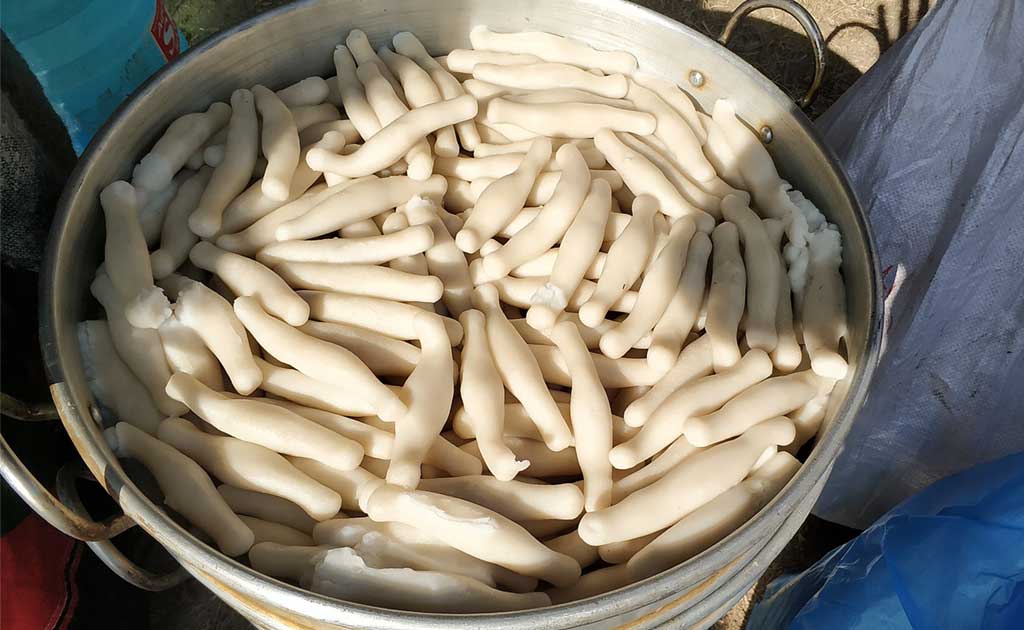
A traditional Tharu meal often includes dhikri—a steamed rice flour dumpling usually served with lentil soup or meat curry. Another local favorite is bagiya, a type of rice flour dumpling stuffed with lentils or vegetables and then steamed to perfection. For the more adventurous food lovers, ghonghi (a snail curry) offers a truly authentic taste of the Terai region. Fish is also a staple in the Tharu diet, with various fried and curried versions served during meals.
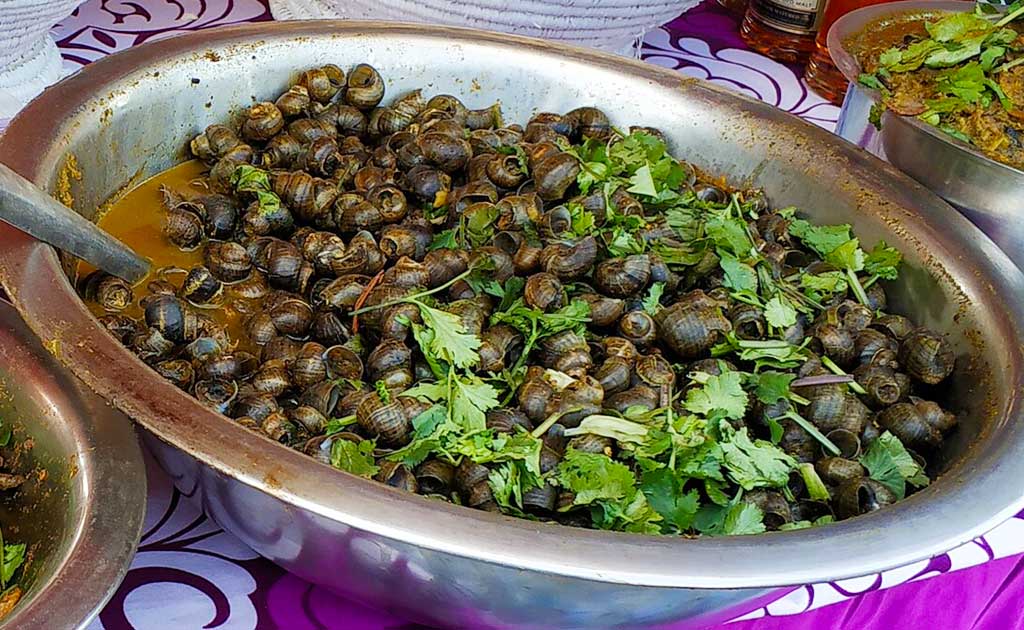
To make the experience complete, many Tharu households serve homemade rice beer or chhyang, a traditional drink enjoyed during festivals and family gatherings. With its variety of flavors and wholesome ingredients, Tharu cuisine adds a warm, homely touch to your Chitwan tour, making it a memorable part of your cultural journey.
Festivals & Celebrations
The Tharu community in Chitwan celebrates a variety of festivals that beautifully reflect their traditions, beliefs, and way of life. Among the most important is Maghi Festival, which marks the Tharu New Year and is celebrated in mid-January. Families gather together to prepare traditional dishes, clean and decorate their homes, and perform rituals to welcome good fortune for the year ahead. It is also a time when people buy new clothes, plan marriages, and settle family matters, making it one of the most vibrant times to visit a Tharu village.
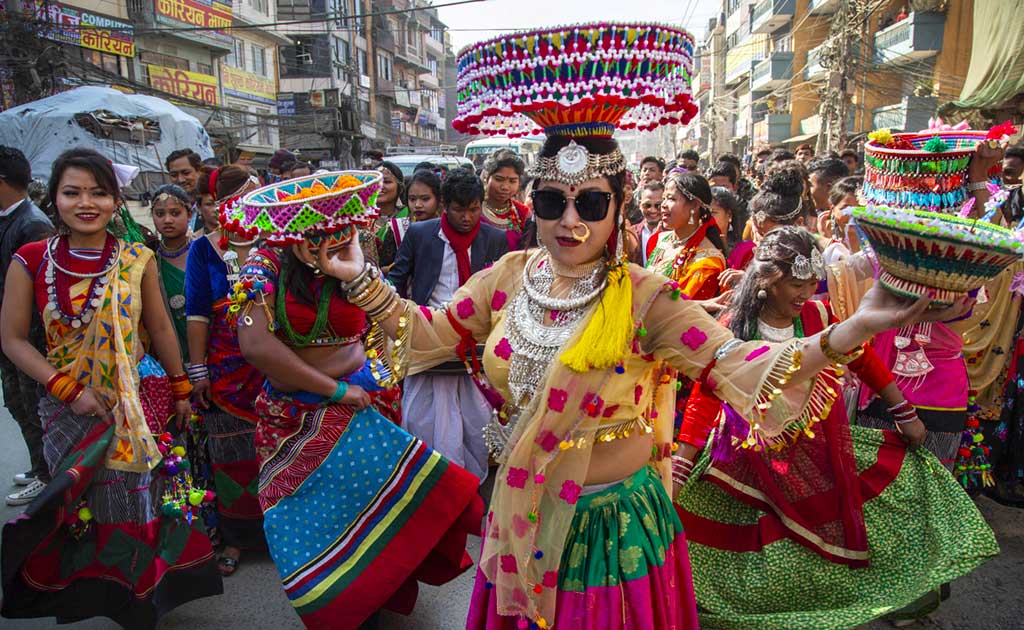
Another important celebration is Jitiya, a festival especially significant for Tharu women. They observe fasting and offer prayers for the well-being and long life of their children and family members. The festival is filled with cultural songs and dances that add color and life to the villages.
Throughout the year, many other local events and rituals take place, often accompanied by traditional music and lively dances. Visiting during these festivals gives you a chance to witness authentic Tharu culture, where the entire community comes together to celebrate with food, music, and heartfelt hospitality.
Tharu Art, Dance, and Music
When you visit Chitwan, one of the most colorful parts of the Tharu culture you’ll experience is their art, dance, and music. The Tharu people have a beautiful tradition of expressing their stories, beliefs, and daily lives through creative forms that have been passed down for generations.
Tharu dances are lively, full of rhythm, and often performed during festivals, celebrations, and cultural programs for visitors. The stick dance, also known as Lathi Nach, is especially popular. It represents unity and strength as dancers move in perfect coordination, creating a mesmerizing beat with sticks. Other dances showcase love, harvest celebrations, and even stories of bravery, making them both entertaining and meaningful.
Music is an essential part of every Tharu celebration. Traditional instruments like the madal (a double-headed drum), dholak, and maadal set the rhythm while locals sing folk songs that reflect their connection to nature, community life, and ancestral traditions. The tunes are simple yet captivating, often encouraging the audience to join in with claps and cheers.
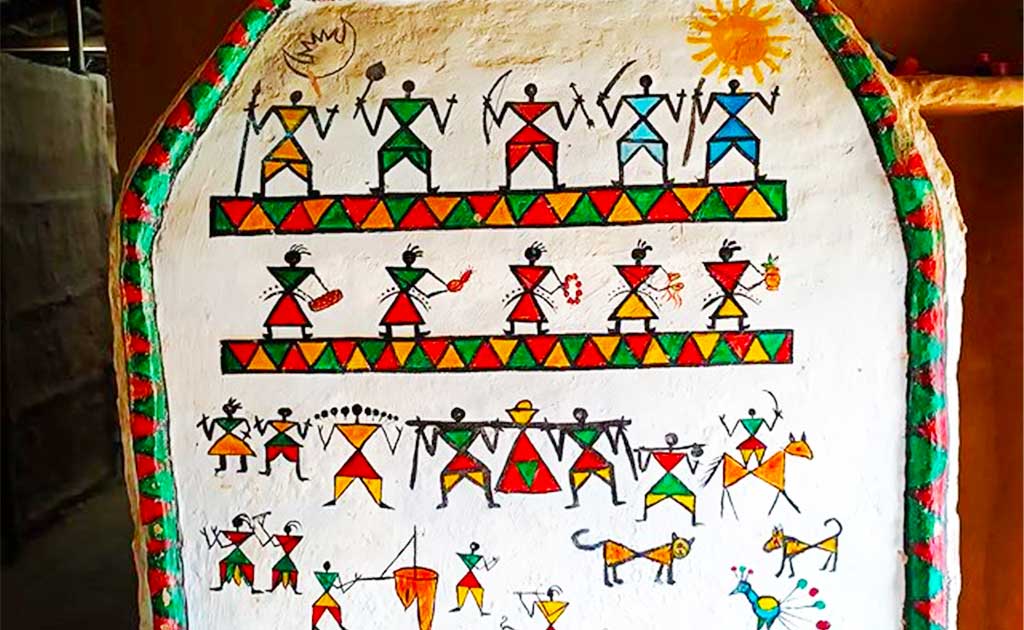
Tharu art is equally fascinating. Many Tharu homes are decorated with vibrant wall paintings called Bhittichitra. These paintings feature geometric patterns, animals, and cultural symbols, giving you a glimpse into the Tharu way of life and beliefs. Along with wall art, Tharu women also craft colorful baskets, mats, and household items using locally available materials like bamboo and grass, showcasing their incredible creativity and skill.
Together, the art, dance, and music of the Tharu people add soul to your Chitwan tour, leaving you with memories that go far beyond the jungle safaris and wildlife adventures.
Tharu Village Tours in Chitwan
When you visit Chitwan, exploring the Tharu villages is one of the best ways to experience the local culture up close. The Tharu people are known for their warm hospitality and unique way of life that has been preserved for generations. A village tour lets you walk through traditional Tharu homes made of mud and thatch, see their beautiful wall art, and learn about their simple yet fascinating lifestyle.
During the tour, you can talk to the locals, watch them work in the fields, or see how they make their handicrafts and traditional tools. In the evening, many villages organize cultural programs where you can enjoy the famous Tharu stick dance and folk music around a bonfire. It’s a lively experience that brings the community’s traditions to life.
Some tours also include local cooking demonstrations or authentic Tharu meals so you can taste dishes like Dhikri or Bagiya. Whether you choose a guided walk or stay in a Tharu homestay, the experience gives you a deeper connection to the culture and people of Chitwan, making your trip much more memorable.
Wildlife & Culture in Tharu Village: The Perfect Combination
The first thing that comes to mind when entering Chitwan is that a safari in Chitwan National Park would be thrilling, with rhinos grazing, crocodiles lying on the riverbanks, and rare birds flying. The visit is also outstanding in the sense that it links this natural miracle with the wonderful culture of the Tharu people. At some point during the day, when you are in a jeep, in a canoe, or just walking, you can go out in the evening to a Tharu village and dine, dance, and listen to music.
This mixture of wildlife adventure and cultural immersion is a full-scope and complete travel experience. The jungle immerses you in the wildness of Nepal, while the Tharu community helps you connect with its humanity. They offer more than just sightseeing recommendations for couples; they offer recollections of anecdotes, customs, and lives.
Visiting Chitwan is not merely a nature observation mission but also a balance between human beings and nature.
Best Time to Experience Tharu Culture
October through March are the most favorable times to study the Tharu culture of Chitwan since the weather is dry, sunny, and pleasant. The moderately low temperatures would be an opportunity to walk around the villages, attend a cultural festival, and even spend the night in a Tharu homestay without sweating or getting drenched in the monsoons.
This is also a favorable month to visit in the year, January, because the Tharu people are celebrating their New Year in the Maghi Festival. Family reunions, classic vibrant and colorful food, and dances characterize the festival, which usually invites visitors to join. Additionally, you will have the chance to experience a range of national and local holidays this season, which will make your visit both fascinating and memorable.
The trip will include the real-life experience of the Tharu culture and the chance to explore the jungles of Chitwan National Park, allowing you to see nature and promote cultural values.
Practical Travel Tips
- Book your Chitwan tour in advance for better deals and availability.
- Hire a local guide to understand the culture and traditions better.
- Wear comfortable clothes and walking shoes for village tours.
- Carry cash as small shops and villages may not accept cards.
- Respect local customs and ask before taking photos of people.
- Try local Tharu cuisine for an authentic cultural experience.
- Stay in a Tharu homestay for a deeper cultural connection.
- Plan your visit around festivals for vibrant celebrations.
- Bring insect repellent, especially during the summer months.
- Combine the cultural tour with a jungle safari for a complete Chitwan experience.
Conclusion
Chitwan is not only the best place to get into wild and exciting jungles, but it is also a treasure trove of cultures, as the Tharu people are the ones that add colour and meaning to your journey. The experience can be made memorable through home cooking, stick dancing, colourful parties and the cultural values of the Tharu people and you will never forget it even after you visit. The Tharu people live in contact with nature, and they are still able to maintain their established culture. A perfect balance between exploration and connection creates an ideal blend of cultural variety and the wildlife of Chitwan National Park.
When you are willing to feel the culture and nature of Chitwan and not only observe it but also experience it, book your Chitwan jungle and cultural adventure today with Nepal Trek Adventure to make unforgettable memories.




